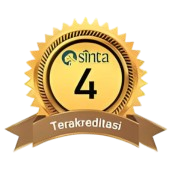THE DEVELOPMENT OF TOURISM BASED ON LOCAL ECONOMIC IN PUJON KIDUL VILLAGE
DOI:
https://doi.org/10.22219/jp.v2i2.11951Keywords:
Create a local, Growing Sensitivity, Local Economic Development, Territorial diagnosisAbstract
The development of Tourism based on local economic is very important, and in many regions with unique physical characteristics that are rich in natural resources which can be further developed to be a popular tourist destination and able to stimulate the local economy such as together The purpose of this research is to find the development of tourism based on local economic in Pujon Kidul village and to find any problems and obstacles in local economic development of local government including the well-being of the community. The main problem that may be a deterrent to development is human resources from the community, because most people in the community There is still relatively little participation in community activities, including the interest in development. The research method used in this study is a qualitative research method, including secondary data and data collection from interviews. There is a descriptive description. Tourism development is based on the local economy, with an emphasis on management in two principles, agriculture and animal husbandry, from the results of this study it can be concluded that an important step in the development of local economy-based tourism is territorial diagnosis and institutional mapping, the process of growing sensitivity, and creating a local forum / regionally. The implementation of these three steps can be said to have been successfully implemented in Pujon Kidul village.Therefore, the study concludes that local economic development and the identification of obstacles to self-government, including what can be resolved quickly, make tourism development more efficient and lead to the fact that local people Can make money To the community for a better quality of life and well-being.
Downloads
References
A. Wibowo, “Pengembangan Desa Wisata Sebagai Model Pemberdayaan Masyarakat di Desa Brayut, Kecamatan Sleman, Kabupaten Sleman, Provinsi Daerah Istimewa Yogyakarta,” Universitas Sebelas Maret. 2010.
Christian Rimbun. “Analysis tourism promotion activities in cafe sawah village tourism pujonkidul ” .2018.Retrieved from http://administrasibisnis.studentjournal.ub.ac.id/index.php/jab/article/view/ 1296/1630. January, 2020.
Desa Wisata Pujonki. “An electronic information system for Pujon Kidul village”. 2017. Retrieved from https://www.sie.pujonkidul.desa.id/. January, 2020.
E. Kastenholz and J. Lima, “The integral rural tourism experience from the tourist’s point of view – A qualitative analysis of its nature and meaning,” Tour. Manag. Stud. vol. 7, 2011. 62–74.
Hastuti, S. Purwantara and K. Nurul, “Model Pengembangan Desa Wisata Berbasis Kearifan Lokal Sebagai Strategi Pengentasan Kemiskinan di Lereng Merapi Kabupaten Sleman Daerah Istimewa Yogyakarta,” Universitas Negeri Yogyakarta. 2013. NIDN-0027066206
Martin Gasser,Carmela Salzano,Roberto Di melgio, Alfredo Lazarte Hoyle, “Pembangunan Ekonomi Lokal Dalam Masa Krisis”,
Kota Batu. “Portal Pesmi Pemerintah Kota Batu”. Retrieved from https://www.batukota.go.id/. January, 2020.
Netralnews. Village Funds Significantly Boost Real Revenues of Pujon Kidul Village. Retrieved fromhttps://en.netralnews.com/news/business/read/26772/village.funds.significantly.boost.real.re venues.of.pujon.kidul.village. March, 2020.
Septiofera, Djambur, Arika. “Analysis of community participation in the development of tourist village (study in pujonkidul village, pujon district, malang district)”. 2016. Retrieved from http://administrasibisnis.studentjournal.ub.ac.id/ index.php/jab/article/view/1296/1630. January, 2020.
Yothin Sawangdee. “Qualitative Research”. Mahidol University. Retrieved from https://www.rlc.nrct.go.th/ewt_dl.php?nid=1079. March, 2020.
Downloads
Published
How to Cite
Issue
Section
License
Authors who publish with Jurnal Partisipatoris agree to the following terms:
- For all articles published in the Jurnal partisipatoris, copyright is retained by the authors. Authors give permission to the publisher to announce the work with conditions. When the manuscript is accepted for publication, the authors agree to the automatic transfer of non-exclusive publishing rights to the publisher.
- Authors retain copyright and grant the journal right of first publication with the work simultaneously licensed under a Creative Commons Attribution-ShareAlike 4.0 International License that allows others to share the work with an acknowledgment of the work's authorship and initial publication in this journal.
- Authors are able to enter into separate, additional contractual arrangements for the non-exclusive distribution of the journal's published version of the work (e.g., post it to an institutional repository or publish it in a book), with an acknowledgment of its initial publication in this journal.
- Authors are permitted and encouraged to post their work online (e.g., in institutional repositories or on their website) prior to and during the submission process, as it can lead to productive exchanges, as well as earlier and greater citation of published work (See The Effect of Open Access).











